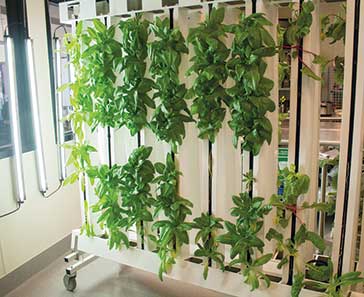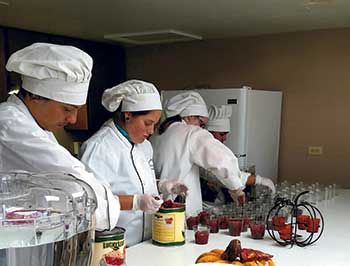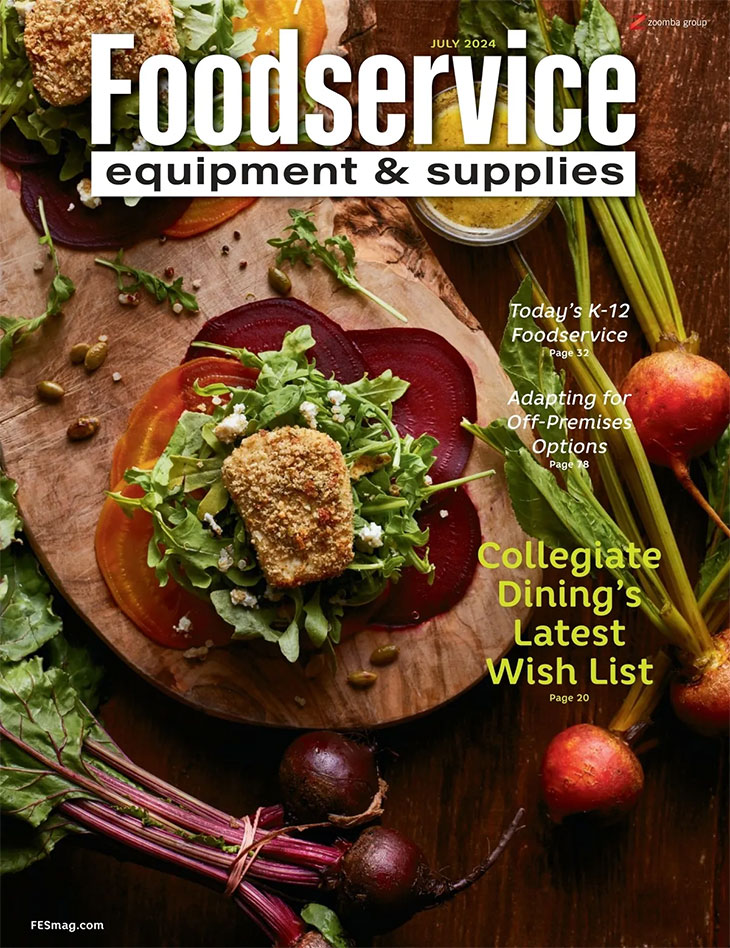Hands-on learning offers unique green education for students in Cheyenne, Wy.
 The hydroponic tower system at Triumph High School requires minimal oversight, save the daily watering.Dr. Michelle Aldrich is on a mission — a green mission. In the last year and a half the culinary arts and consumer science teacher at Triumph High School in Cheyenne, Wy., has implemented a vertical, hydroponic garden in the school’s commercial teaching kitchen; incorporated hyper-local food into the school’s catering program; and even helped plan and host an intensive, three-day conference featuring local growers, beekeepers and educators in the field of agriculture and sustainability.
The hydroponic tower system at Triumph High School requires minimal oversight, save the daily watering.Dr. Michelle Aldrich is on a mission — a green mission. In the last year and a half the culinary arts and consumer science teacher at Triumph High School in Cheyenne, Wy., has implemented a vertical, hydroponic garden in the school’s commercial teaching kitchen; incorporated hyper-local food into the school’s catering program; and even helped plan and host an intensive, three-day conference featuring local growers, beekeepers and educators in the field of agriculture and sustainability.
The best part is that her students — which rotate every nine weeks — couldn’t be more excited about getting involved. “Our students have a great work ethic and a strong interest in agriculture, food and restaurants,” says Aldrich.
Triumph’s catering program started 15 years ago as a way to raise money for students to compete in the National Restaurant Association’s ProStart program. It also provided students an extracurricular activity at a school that lacks sports teams as an after-school option. “We cater 100 jobs a year, from 20-person Cub Scout lunches for moms to weddings and barbecues with more than 900 people,” Aldrich says. “The program gives students the opportunity to work with other products outside of their classes, and do a lot more cooking and food preparation in larger volumes than just cooking for their own classmates. It becomes a win-win because the customers only end up paying for the food costs, and the students get valuable experience.”
The program has become so successful that it requires no marketing; word of mouth accounts for all of the jobs it gets. But it’s become even more successful since the students have been able to use the harvest from the on-site garden.
Funds for the garden came about after Dr. Aldrich wrote, and was awarded, a grant from the Cheyenne School Foundation in October 2015. She immediately contacted a Wyoming-based manufacturer of vertical, mobile and hydroponic gardens. By the time the school had Thanksgiving break, she was able to pick up and install the system with the company’s help.
System in Action
At just 6 feet long and 8 feet tall, the 16-tower system easily fits along the back wall of the kitchen underneath a row of stationary grow lights. Every day, the students flip the garden easily, thanks to the system’s built-in wheels. Water flows from the wells and irrigation canals through the enclosed system outfitted with hydrating sponge-like material. It requires daily watering to keep the wells full, but other than that, the system needs minimal oversight. The garden fit so seamlessly in the kitchen that no changes were required, except moving some tables further away so people didn’t knock off the leaves or bump into the structure.
Operators typically use these systems for lettuces and some greens not requiring soil, along with herbs and smaller vegetables. While vining plants like tomatoes and strawberries could work in such a system, Aldrich says the school had to skip those because the fire department viewed it as a fire hazard, given the vines would need to be tied to the ceiling.
Using the small, compact system, student volunteers harvest a whopping 30 to 50 pounds of lettuce a month. To keep a constant supply going, the students help maintain seedlings in a separate container under grow lights, alternating planting and harvesting. “We’re able to turn a crop in 35 days,” Aldrich says.
In fact, the small garden yields so much produce that the school fed all 100 guests at the PermaU conference just off that. “We served green salad with kale, kohlrabi and the lettuces we grew, and an all-vegetable soup,” she says. The school is also working on using the harvest produce to develop a condiment that can be packaged and sold at farmers markets or restaurants in the area.
 Triumph High School’s catering program gives students hands-on foodservice experience.For the PermaU conference held in March of last year, Aldrich and her students — who compete as part of SkillsUSA — recruited a diverse group of experts to talk about sustainable agriculture. That range of speakers included a beekeeper, a poultry farmer, a microgreens grower, a fermentation master, professors from the University of Wyoming, and an artisan who makes natural soaps and lotions. Open to the public, the conference “exposed the community to more sustainable agriculture practices and initiatives that can be accomplished in an urban environment,” Aldrich says.
Triumph High School’s catering program gives students hands-on foodservice experience.For the PermaU conference held in March of last year, Aldrich and her students — who compete as part of SkillsUSA — recruited a diverse group of experts to talk about sustainable agriculture. That range of speakers included a beekeeper, a poultry farmer, a microgreens grower, a fermentation master, professors from the University of Wyoming, and an artisan who makes natural soaps and lotions. Open to the public, the conference “exposed the community to more sustainable agriculture practices and initiatives that can be accomplished in an urban environment,” Aldrich says.
Funds from the grant also went toward composting equipment in the form of two large barrel drums that students turn daily when they go to take out the trash. All pre-consumer food waste in the form of scraps and leftover food not served through the catering and school lunch programs gets composted rather than being sent to the landfill.
Though last year the compost system didn’t produce enough material for use as a soil amendment, Aldrich says the school is on track to package and provide the compost for school landscaping, as well as local nurseries and residents who want to use it with their potting soil at home.
There’s nothing like this type of hands-on green education. “Even though we’re an agricultural state, Cheyenne is considered more urban and a lot of times, students think all produce comes from Walmart, but they don’t actually know about the growing process,” says Aldrich. “Working on this garden gives us an opportunity to talk about different types of vegetables and nutrients and soil nutrition and learn where our food comes from."




